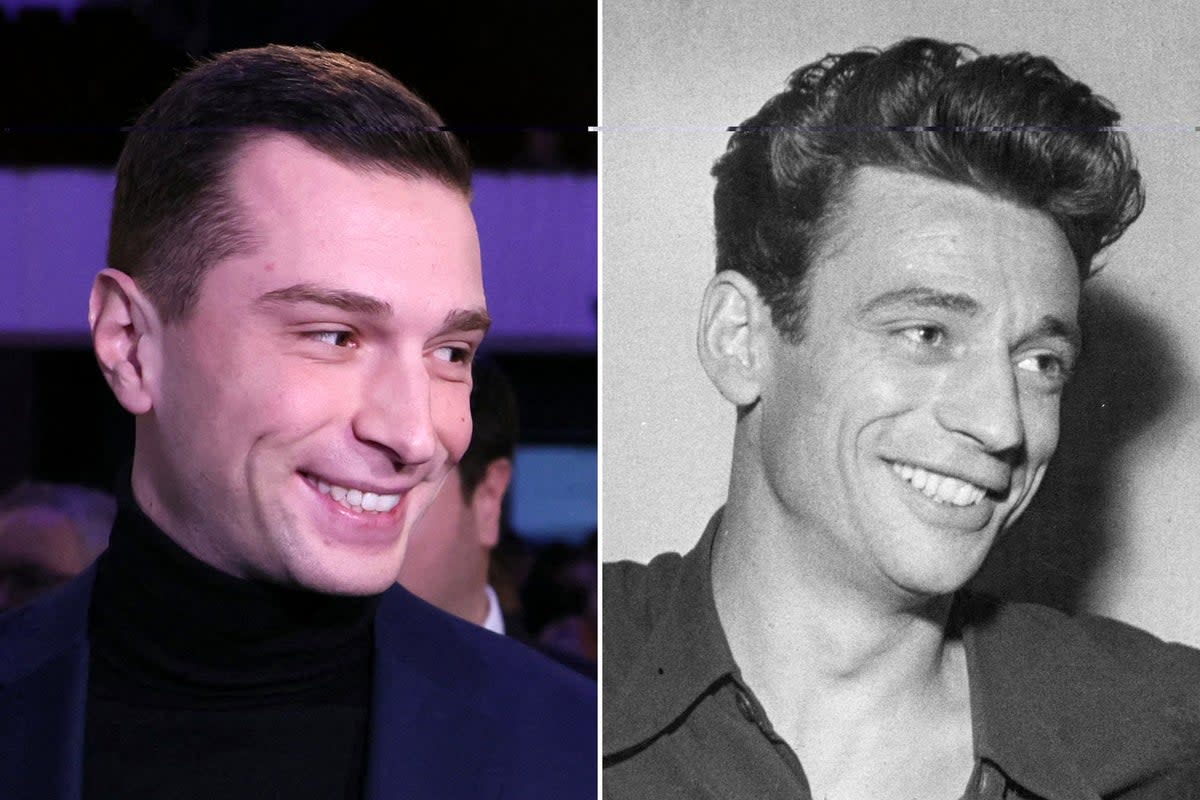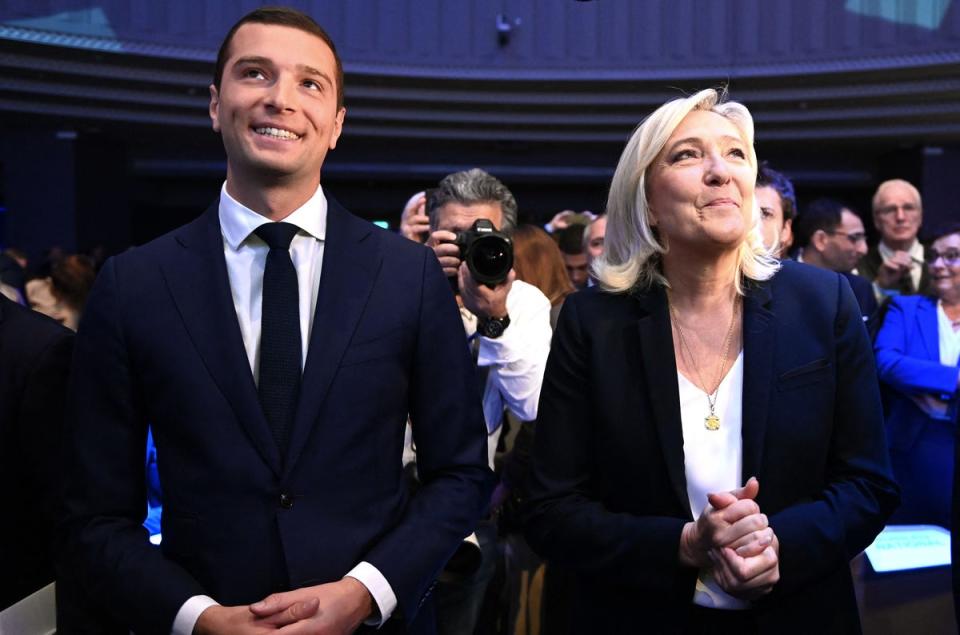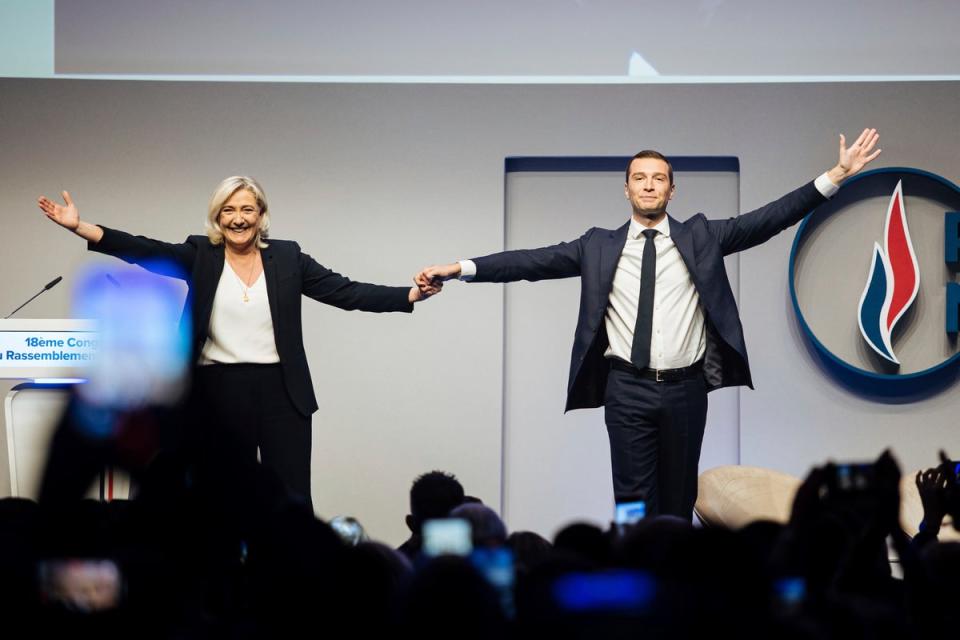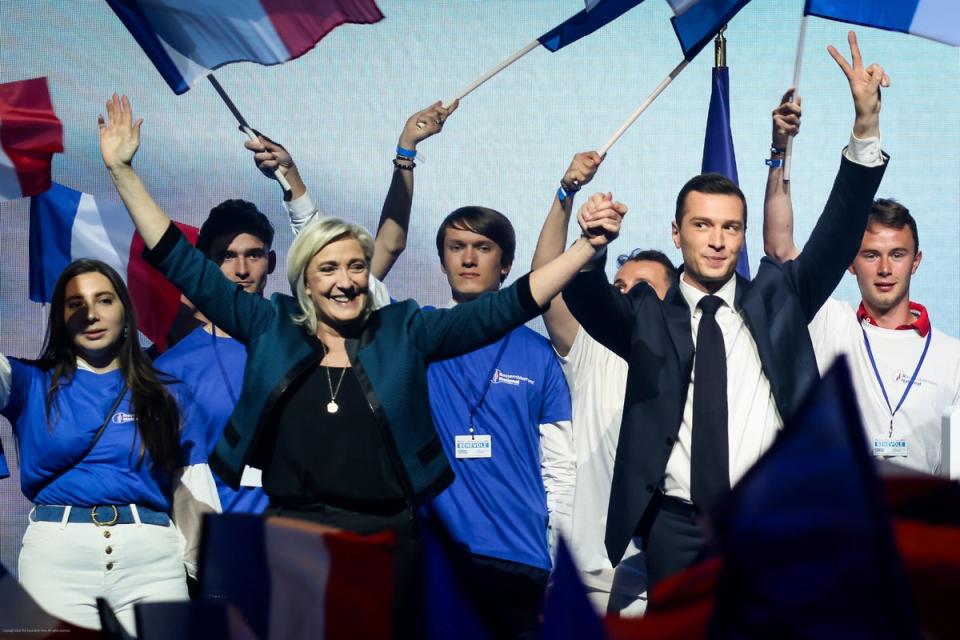Who is Jordan Bardella? Marine Le Pen’s 28-year-old protege with film star looks who made Macron panic

Jordan Bardella has been credited with the success of France’s far-right National Rally (RN) party as it surges in the polls.
Charismatic Bardella, the son of immigrants, was brought up in high-rise flats in a run-down suburb of Paris by a single mother. The 28-year-old could be prime minister of France in a matter of weeks after Emmanuel Macron shocked the nation by calling a snap election in the wake of his party’s thrashing at the ballot box.
Bardella, president of RN, inflicted a serious blow to President Macron and his Renaissance party, taking more than 30 per cent of the vote at in the EU parliamentary elections earlier this month. Alongside Marine Le Pen, Bardella will be the face of RN as it tries to win a majority in parliament. On Sunday, RN took the lead in the first round of voting in the snap election, polling 34 per cent of the vote.

The decision by Macron to dissolve France’s parliament and let “the sovereign people have their say” could hand major political power to the far right after years on the sidelines.
Bardella was quickly identified as a rising star in the party he joined as a teenager and he took over as president of RN in 2022. “He is not affected by the taboo that surrounds the National Front vote,” Le Pen has previously said, adding: “He’s part of a new generation.”
An effective communicator with a carefully crafted public image and more than 1.2 million followers on TikTok, Bardella has made much of his background, raised in a tower block in the Paris suburb of Seine-Saint-Denis by his mother, an Italian immigrant. Bardella attended a private school, the Lycee Saint-Jean-Baptiste-de-la-Salle, where the fees were reportedly paid by his father.
Having dropped out of a geography course at Paris-Sorbonne University to focus on politics, Bardella has sought to paint the suburb of his youth as violent and unpredictable – contrasting himself with the political elite while taking aim at the suburb’s high concentration of migrants and refugees.

In a speech to enthusiastic Tricolore-waving supporters at a Paris arena last week, Bardella claimed France’s civilisation “could die ... because it will be submerged in migrants who will have changed our customs, culture and way of life irreversibly”. It is this kind of rhetoric that Macron is calling on France to come together to stamp out.
Bardella has toed a more cautious line on certain international policy questions than Le Pen, condemning Russia’s war in Ukraine while abstaining on a vote over military aid for Kyiv. And in March, he told Politico that NR would only pursue its policy of leaving Nato’s integrated command once hostilities had ceased, saying: “You don’t change treaties in wartime.”
His popularity in France is clear – and among voters of all ages – with Bardella emerging as the only politician on a list compiled by the newspaper Le Journal du Dimanche of the 50 most popular figures in France. Ipsos polling had suggested around a third of 18- to 24-year-olds would vote for him during the European parliamentary elections.
He has spoken of an aspiration to replace the European Union with a “Europe of Nations”. The Europe of 2016, the year of the Brexit referendum, is “not the same Europe as it is today”, he said recently. “And I hope that with this Europe of Nations that we intend to build, the British will be able to return to the table.”

At the Marseille launch of RN’s European Union election campaign in March, the loudest cheers came not for Le Pen – but for her protege, whom she formerly affectionately dubbed her “lion cub”, now “the lion”, and who is reportedly dating her niece Nolwenn Olivier.
However, for his critics, Bardella offers more style than substance.
“He’s attracting a maximum of voters by not taking a clear stance on anything,” said François-Xavier Bellamy, European leader of the conservative Les Republicains, who suffered their worst defeat in the ballot’s history last week. “I quickly saw his convictions were very malleable,” Le Pen’s former deputy Florian Philippot told Politico.
And Pascal Humeau, RN’s former communications chief who gave Bardella intensive media training, has described him as originally “repeating Le Pen’s formulas, an empty shell, very controlled, but knowing little of what was happening in France or the world”.
“In terms of depth, he was pretty limited, Humeau told the documentary Complément d’enquête. “His ease, his enthusiasm, that you can feel today, we had to work on it for months and months.”

Bardella had been relatively free from scandal until earlier this year when broadcaster France 2 alleged that he had used an anonymous Twitter account to share racist messages between 2015 and 2017. He has denied the account was his, while his party threatened legal action against the channel’s owners.
Despite his growing profile increasingly being viewed as threatening her own position, Le Pen has remained fiercely defensive of her protege, reportedly pushing NR’s vice-president against a wall in the National Assembly and threatening his expulsion over complaints he had made about Bardella.
“I can get hit by a truck tomorrow,” Le Pen told broadcasters in March, adding that Bardella would have “the political status and confidence” to replace her.
The pair continued to paint a united front on Sunday, with Bardella – who has offered to act as Macron’s prime minister if NR were to secure victory – standing alongside Le Pen as she declared her party would “put an end to this painful epoch of globalism”, adding: “We’re ready to exercise power.”
Describing him as “the media beast of today who scares his opponents”, Humeau told The New York Times: “He has had one objective since the age of 17 – to become prime minister and president. And I don’t think anyone can derail him.”

 Yahoo News
Yahoo News 
